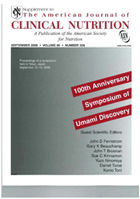2008年6月11日

| Introduction to the symposium | JD Fernstrom | |
| The gourmet ape: evolution and human food preferences | JR Krebs | |
| Umami and the foods of classical antiquity | RI Curtis | |
| Glutamate: from discovery as a food flavor to role as a basic taste (umami) | K Kurihara | |
| Sensory and receptor responses to umami: an overview of pioneering work | GK Beauchamp | |
| History of glutamate production | C Sano | |
| T1R receptors mediate mammalian sweet and umami taste | X Li | |
| Taste receptors for umami: the case for multiple receptors | N Chaudhari, E Pereira, and SD Roper | |
| Metabotropic glutamate receptor type 1 in taste tissue | A San Gabriel, T Maekawa, H Uneyama, and K Torii |
|
| Multiple receptors underlie glutamate taste responses in mice | K Yasumatsu, N Horio, Y Murata, S Shirosaki, T Ohkuri, R Yoshida, and Y Ninomiya |
|
| Umami taste transduction mechanisms | SC Kinnamon | |
| Glutamate taste and appetite in laboratory mice: physiologic and genetic analyses | AA Bachmanov, M Inoue, H ji, Y Murata, MG Tordoff, and GK Beauchamp |
|
| Variation in umami perception and in candidate genes for the umami receptor in mice and humans | N Shigemura, S Shirosaki, T Ohkuri, K Sanematsu, AAS Islam, Y Ogiwara, M Kawai, R Yoshida, and Y Ninomiya |
|
| Perceptual variation in umami taste and polymorphisms in TAS1R taste receptor genes | Q-Y Chen, S Alarcon, A Tharp, OM Ahmed, NL Estrella, TA Greene, J Rucker, and PAS Breslin |
|
| Early milk feeding influences taste acceptance and liking during infancy | JA Mennella, CA Forestell, LK Morgan, and GK Beauchamp |
|
| Nonsynonymous single nucleotide polymorphisms in human tas1r1, tas1r3, and mGluR1 and individual taste sensitivity to glutamate | M Raliou, A Wiencis, A-M Pillias, A Planchais, C Eloit, Y Boucher, D Trotier, J-P Montmayeur, and A Faurion |
|
| Taste and weight: is there a link? | LF Donaldson, L Bennett, S Baic, and JK Melichar |
|
| Functional neuroimaging of umami taste: what makes umami pleasant? | ET Rolls | |
| Metabolism and functions of L-glutamate in the epithelial cells of the small and large intestines | F Blachier, C Boutry, C Bos, and D Tome |
|
| Taste signaling elements expressed in gut enteroendocrine cells regulate nutrientresponsive secretion of gut hormones | Z Kokrashvili, B Mosinger, and RF Margolskee |
|
| Luminal chemosensing and upper gastrointestinal mucosal defenses | Y Akiba | |
| Activation of the gut-brain axis by dietary glutamate and physiologic significance in energy homoeostasis | T Kondoh, H Nanda Mallick, and KTorii |
|
| Protein, amino acids, vagus nerve signaling, and the brain | D Tome, J Schwarz, N Darcel, and G Fromentin |
|
| Can dietary supplementation of monosodium glutamate improve the health of the elderly? | S Yamamoto, M Tomoe, K Toyama, M Kwai, and H Uneyama |
|
| Metabolic fate and function of dietary glutamate in the gut | DG Burrin and B Stoll | |
| Hepatic glutamate metabolism: a tale of 2 hepatocytes | ME Brosnan and JT Brosnan |
|
| Regulation of glutamate metabolism and insulin secretion by glutamate dehydrogenase in hypoglycemic children | CA Stanley | |
| The blood-brain barrier and glutamate | RA Hawkins | |
| Role of glutamate in neuron-glia metabolic coupling | PJ Magistretti | |
| Symposium summary | JD Fernstrom | |